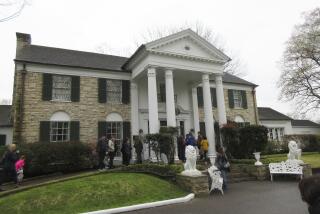FBI Investigates Lamb Realty for Alleged Fraud Against Banks : Financing: The inquiry is to determine whether the company illegally overstated homes’ selling prices to lenders.
The FBI is investigating a Ventura County real estate brokerage that also operates in the San Fernando Valley for possible bank fraud violations, The Times has learned.
Lamb Realty and an escrow firm also owned by Ray E. Lamb allegedly overstated to lenders the selling prices of homes so that the excess amount could be used by buyers who lacked the necessary down payment to qualify for mortgages, real estate sources said. The business has offices in Woodland Hills and Studio City and six others in Ventura County.
Gary Auer, head of the FBI’s Ventura office, would neither confirm nor deny that there is an investigation, as is the agency’s customary practice.
Lamb confirmed Thursday that the FBI more than a year ago seized a collection of company records, which sources said remain in the agency’s custody.
But Lamb contended that the seizure was related to prior disciplinary action against him and four of his agents in 1990 by the state Department of Real Estate. He said he has gotten no indication that he or his companies are the target of a current FBI investigation.
“There was nothing beyond that initial contact,” said Lamb, who denied making any illegal escrow account transfers.
The investigation comes at a time of financial difficulty for the Thousand Oaks-based real estate firm, which filed for protection from creditors under Chapter 11 of the federal bankruptcy code last month.
It also comes on the heels of the state real estate department’s one-year revocation of Lamb Realty’s license for negligence and improper supervision of its agents, misdeeds that real estate sources said prompted the FBI to investigate further. The company was allowed to remain open under state supervision, while Lamb and his agents were granted restricted licenses and put on probationary status for a year.
The firm, Lamb and four agents were disciplined for two deals in 1986 and 1987 involving transactions with Home Savings. Neither the buyers, the sellers nor the lenders lost any money in those cases. No criminal charges were filed.
Because of its size--eight offices in Ventura and Los Angeles counties--Lamb’s firm has frequently represented both sellers and buyers, meaning his company and agents got all commissions. His escrow business, which handled paperwork with the lenders, also profited from each sale it handled.
The practice of inflating selling prices would not mean a loss to lenders as long as the mortgages were paid on time. But it exposes the lending institutions to undue risk, especially in deflated real estate markets. If borrowers defaulted on the loans, lenders would have to sell the properties at a loss, sources said.
The state real estate department issued a cease-and-desist order against Lamb’s escrow company for keeping inadequate records and failing to place customers’ funds in neutral accounts.
In filing for Chapter 11 protection last month, the company listed $8.4 million in debts and $10 million in assets, including an undeclared amount for the company’s “good will,” which represents the value of its business name and other intangibles related to its earning power.
Lamb said Thursday that the bankruptcy filing was brought on by the combination of the depressed real estate market and Mitsui Manufacturers Bank in Woodland Hills calling in a $775,000 loan in September.
A former business associate of Lamb’s, who requested anonymity, said the bank refused to extend a rollover loan on which Lamb had been making all interest payments.
The associate also said the FBI has been looking into Lamb’s records for nearly two years without taking action.
Lamb Realty Co. Inc. officially changed its corporate name in Sacramento to VCRE Corp. one week before filing its Dec. 18 petition in U.S. Bankruptcy Court in Los Angeles. It is a common practice for distressed companies to alter their names before bankruptcy filings to forestall creditors discovering how shaky their businesses are, court officials said.
Filing for Chapter 11 protection, unlike a Chapter 7 liquidation, allows companies to postpone paying their debts until their businesses can recover. To get the petition approved by a bankruptcy court judge, the company must present a reorganization plan complete with a rundown on when, and how much, it will repay its creditors.
VCRE Corp. indicated in its filing that it estimates that there will be enough funds available to distribute to unsecured creditors.
Lamb, who owns the real estate company jointly with his wife, Dianne, opened his first office in Thousand Oaks in the 1970s. The business employs more than 300 agents and support staff.
Lamb maintained that business has been good and that neither his employees nor the public need worry about the bankruptcy, which he called a temporary financial setback.
“Everything is operating as it always would,” Lamb said.
More to Read
Inside the business of entertainment
The Wide Shot brings you news, analysis and insights on everything from streaming wars to production — and what it all means for the future.
You may occasionally receive promotional content from the Los Angeles Times.










